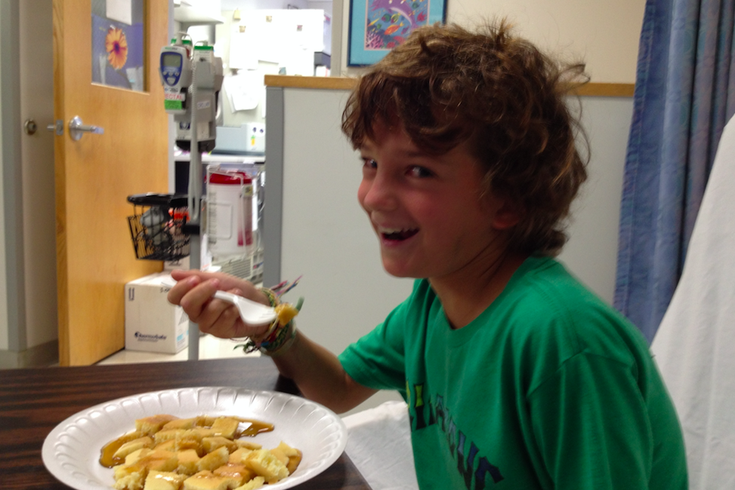
June 08, 2017
 Gwen Keiser/Courtesy
Gwen Keiser/Courtesy
Isaac Keiser eats pancakes at Children's Hospital of Philadelphia in 2012. Doctors at CHOP have helped rid the teen of his egg allergy, a years-long process.
Gwen Keiser is amazed that her 15-year-old son, Isaac, can finally eat french toast.
Since he was one year old, Isaac couldn't go near the breakfast food. Or cookies. Or brownies. Or most foods, really.
Keiser discovered that her son couldn't eat egg when he was just a baby because of his anaphylaxis, but after years of working with doctors at the Children's Hospital of Philadelphia, he's been cured.
"It's literally changed our lives," Keiser said Wednesday.
Keiser doesn't like to use the word "cured," but Dr. Jonathan Spergel, chief of the hospital's allergy section, would venture that far.
"With him? He's probably cured," Spergel said. "In theory, I think he's probably fine at this point."
Isaac Keiser is the first patient to be desensitized in CHOP's unique study using baked eggs. The more cooked the egg, the less severe of a reaction. So, Isaac started off by eating meringue cookies and then progressed to scrambled eggs.
"I feel great," he said. "Literally, I just got home from eating brunch where I ate pancakes with eggs in them."
Gwen Keiser first discovered Isaac's food allergies when he was a baby.
Isaac Keiser now has to eat keep eggs in his diet to work against the allergy. He eats food with eggs in them about three times a week – down from five times a week. Since eggs are in so many foods, it's pretty easy for him, he said.
"Every day he's saying he just wants to try this, wants to try that," his mother said. "I'm stupefied every day that he wants to try all these types of foods."
It's been a long road for the Keisers, who have been working on Isaac's egg allergy since 2012. His allergy to milk and tree nuts that he developed as a baby have gone away on their own, though he still must manage his allergies to peanuts and fish.
But peanuts and fish are much easier to avoid than eggs, Gwen Keiser said.
"I love pancakes, I love Ben and Jerry's ice cream," Isaac said. "Cookies and cakes, sort of everything."
Spergel, who has been with CHOP since 1998, said that allergies in children have greatly risen in the last 20 years – nearly six million American children suffer from food allergies, with milk, eggs, peanuts, wheat, soy, fish and shellfish being some of the most common. That's about two kids per school classroom.
CHOP is partnering with various pharmaceutical companies and the National Institutes of Health on several clinical trials to find new "cures" or ways to treat eosinophilic esophagitis, IgE-mediated food allergies, food desensitization, asthma and atopic dermatitis.
Spergel said it's a joy to be able to watch children once limited by their condition enjoy foods they couldn't have before. Though, he urges people to not try to attempt to desensitize themselves at home.
"The kids are like, 'I can be a normal kid,'" he said. "'I can go out for a slice of pizza and not worry and that is such a relief. Wow, I'm a normal person.'"
Isaac Keiser said he's extremely thankful to all the physicians, like Dr. Rushani Saltzman, who he worked with most, for helping him lead a more normal day-to-day.
"It's been such a gift to my life and has given me so much peace of mind," he said.
• • •
Dr. Spergel encourages parents interested in finding out about future studies that could help with their children's allergies to email foodallergyresearch@email.chop.edu.
 Photo courtesy/Gwen Keiser
Photo courtesy/Gwen Keiser